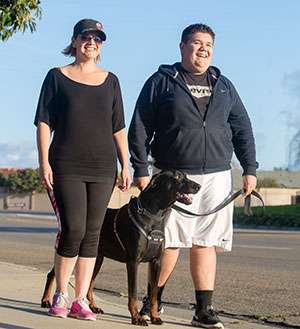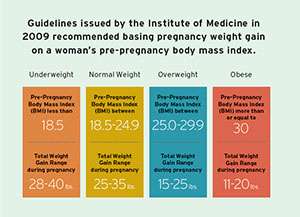Obesity poses serious health risks for moms and their babies

Veronica Romero was 21 years old and worried. Pregnant with her first child, she was putting on a lot of weight. Her obstetrician leveled with her: "You're gaining too much." But as she neared 50 pounds of weight gain near the end of her pregnancy, Romerfo felt helpless. "I tried to watch what I was eating, but it was so hard. Pregnant women get cravings, and my cravings were sugary," recalls Romero, who had fought her weight even before conceiving.
"I tried to eat carrots and small appetizers, but it didn't work. I was disappointed. I didn't want to get bigger." The pregnancy set into motion a health crisis on two fronts: for Romero, now 38, and her son, Anthony, now 17. Romero eventually grew to nearly 300 pounds, and Anthony became a big baby, a chubby toddler and an obese adolescent.
This mother-child pair is not unique. The obesity tsunami that has washed across the United States over the past four decades swept up pregnant women and their off spring, too. In fact, pregnant women today are considered by some medical authorities to be at the nexus of the obesity crisis. Abundant research has revealed that pregnancy is a key period of increased risk for developing obesity in women and that obesity in pregnancy may fgenetically "program" off spring to become overweight or obese later in life.
The concept, commonly known as fetal programming, is rapidly altering the fields of obstetrics and pediatrics—and not a minute too soon, says Sherin U. Devaskar, MD, Mattel Executive Endowed Chair of the Department of Pediatrics, physician-in-chief of Mattel Children's Hospital UCLA and assistant vice chancellor of children's health. "There have been many studies to prove beyond a doubt that fetal programming is real, and it affects many populations," she says. "If a mother is obese, her babies are at very high risk for obesity and chronic disease."f
Indeed, the age-old cultural wisdom of "eating for two" during pregnancy is almost heretical. In the United States, more than one-half of pregnant women are overweight or obese, according to the American College of Obstetricians & Gynecologists. An estimated 9 percent of babies are born macrosomic, weight considered too large for their gestational age. Fetal macrosomia is typically defined as a birth weight of more than 9 pounds 15 ounces (4,500 grams), regardless of gestational age.
However, obesity in pregnancy can also result in babies who are born prematurely or underweight. These infants, too, seem to have a predisposition to obesity and obesity-related diseases, such as diabetes and heart disease, later in life, Dr. Devaskar explains.
More than three decades ago, David Barker, MD, a British physician and epidemiologist, discovered a link between low birth weight and the risk of developing cardiovascular disease later in life. Later, Dr. Barker linked birth weight, whether excessively high or low, to a heightened risk of heart disease, type 2 diabetes and obesity in off spring. In what became known as the Barker hypothesis, he posited that these diseases had their roots, at least in part, to under- or over-nutrition during pregnancy. If a pregnant woman is under-nourished, her infant is prone to low birth weight with a later, rapid "catch-up" gain in body fat when exposed to plentiful food. If a pregnant woman is over-nourished, her infant is prone to high birth weight and a booming growth trajectory that increases the risk of obesity later in life.
The amount of nutrients provided to a developing fetus, as well as the type of nutrients, appears to chemically modify genes that predispose a child to obesity and obesity-related diseases, says Dr. Devaskar, whose own research on the subject resulted in her election to the prestigious Institute of Medicine in 2012. Her current research focuses on whether or not it's possible to further modify those genes to reverse the propensity to gain weight. "In the fetus, the organs are still developing," she explains. "It's a critical window of development, and it's very plastic at that time. Any insult—whether it's from diet or drugs or toxins—creates a permanent mark that lasts for one's lifetime. The hypothalamus (the part of the brain governing metabolism and hunger) is already programmed. The infant is used to seeing so much nutrition coming from the mother. These children are ever-hungry; they are born hypersensitive to high-calorie foods. Their insulin sensitivity is low, so they are at high risk for developing diabetes, obesity and heart disease."
In 2009, the Institute of Medicine issued revolutionary new guidelines to begin to address obesity in pregnancy—the first revision to the recommendations in two decades. The group put tighter limits on weight gain in pregnancy, warning doctors to help their patients stay within a healthy range and even strictly limit weight gain in women who are already obese to 11-to-20 pounds.

"It's a major change," says Aisling Murphy, MD (FEL '11), assistant professor in the Division of Maternal-Fetal Medicine. "More recent data have suggested that obese women really don't need to be gaining as much weight as women who enter pregnancy at a normal weight. Obstetricians are aware of this, and we're all doing our best to counsel patients about the importance of these recommendations."
Moreover, the group, citing numerous studies, issued advice encouraging pregnant women to exercise—something many women had been fearful of doing. "Sometimes, women are under the impression that they shouldn't be walking or going to the gym when they are pregnant. That is not the case," Dr. Murphy says. "They really should be active. If a woman has been sedentary, we use this opportunity to have her start doing a little bit of exercise—as much as she can tolerate."
For obstetricians, addressing body weight and physical activity during pregnancy has both risks and rewards. It can be difficult to broach the subject of weight with an obese patient, Dr. Murphy notes. Yet, at the same time, pregnant women want to bring healthy children into the world and are typically highly motivated to adopt lifestyle changes. "Pregnancy is a great opportunity to address the issue of weight with patients," she says. "Sometimes it's a difficult discussion, to have to tell someone they have to watch their weight. But in pregnancy, women have the added motivation of their baby's health and the potential impact weight gain may have on their child."
In addition to the risk of fetal programming, obesity during pregnancy is linked to several other potential complications. The chances of developing both hypertension and gestational diabetes are higher in pregnant women who are obese. Studies show women who develop gestational diabetes have an increased likelihood of developing type 2 diabetes later in life. In essence, gestational diabetes often isn't a "temporary" condition that goes away after childbirth.
About 7 percent of pregnant women in the United States develop gestational diabetes, which comes out to about 200,000 cases annually. "When patients arrive for their first prenatal visit and they are obese, we tend to be more proactive in screening for pre-existing diabetes or pre-diabetes," Dr. Murphy says. "There is an increased awareness that this problem is extremely common."
Obesity during pregnancy also raises the risk of some types of birth defects and other complications, such as an increased risk of Cesarean section or complications during childbirth, she notes. "Something as simple as performing an ultrasound examination to look at a baby's anatomy becomes much more difficult if the mother is overweight or obese."
Veronica Romero has struggled to let go of the feeling that she was somehow responsible for Anthony's weight problems. "I come from a family where my dad is big-boned, my cousins and uncle are big-boned; I think it's genetic for us," she says. "But sometimes I feel guilty. I ask myself, 'Did I eat too much when I was pregnant?' I blame myself. So now I support Anthony 100 percent."
Two decades ago, few pregnant women were given the extra resources and support they needed to manage weight gain. But that has changed, Dr. Murphy says. Overweight or obese women who are planning to have a child are encouraged to seek pre-conception counseling, where they are given advice and resources to help them lose weight before becoming pregnant. "If we can take care of young women before pregnancy and during pregnancy, we will end up with a healthier society, and it will bring down healthcare costs dramatically," Dr. Devaskar says.

Meanwhile, pregnant women who are obese now are typically referred to a registered dietician for assistance with a healthy diet. Breastfeeding for at least six months is highly recommended to help the mother lose weight. For the baby, breast milk is considered healthier than formula, which can cause rapid weight gain in infants.
"Breastfeeding has been shown to decrease inflammation," Dr. Devaskar says. "Obesity is considered an inflammatory syndrome. Breast milk helps counteract obesity."
Physicians also have changed their approach to managing babies born to overweight and obese mothers, says Alma Guerrero, MD '03 (RES '06), assistant clinical professor of pediatrics. Pediatricians have always kept a close eye on infancy. You don't want to wait until a child is 2 years old to address weight status. Weight is something I'm monitoring at every visit."
Pediatricians offer new parents advice about how to gauge an infant's hunger cues and when to start solid foods. Children who are gaining too much weight may need more help, such as the assistance provided at UCLA's Fit for Health Program. The clinic provides comprehensive and structured services aimed at childhood obesity.
Involving the entire family in lifestyle changes, such as engaging in more exercise and adopting a healthier diet, is a highly successful strategy, Dr. Guerrero says. "One of the things I learned when I was a medical student and interviewed moms is how important this notion of family cohesion is in supporting behavioral changes," she notes. "It's very common for a father or grandmother to not be supportive or to undermine behavioral changes that one parent may want to try to implement at home."
Veronica Romero is an example of making a healthy lifestyle a family affair. She has lost 150 pounds since undergoing gastric-bypass surgery at UCLA three years ago. Anthony is now enrolled in UCLA's Fit clinic. He is losing weight and will apply to undergo bariatric surgery next year. "I am so excited to see him so happy; he has never lost weight before this," Romero says. "At the Fit clinic, they motivate him. He gets weighed and measured. They give him a list of what to eat during the week, and he gives them a record of what he's eating. He goes to the gym three times a week for two hours, plus he walks around the neighborhood."
Romero and her two children try to turn off the television during dinner to focus on healthy eating. Then they take the dog out for walks together. "It does help if we're all working on it together," she says. "I told Anthony, 'If you want to walk, I'll walk with you.' I always do everything with him, because I understand what he's going through."

















